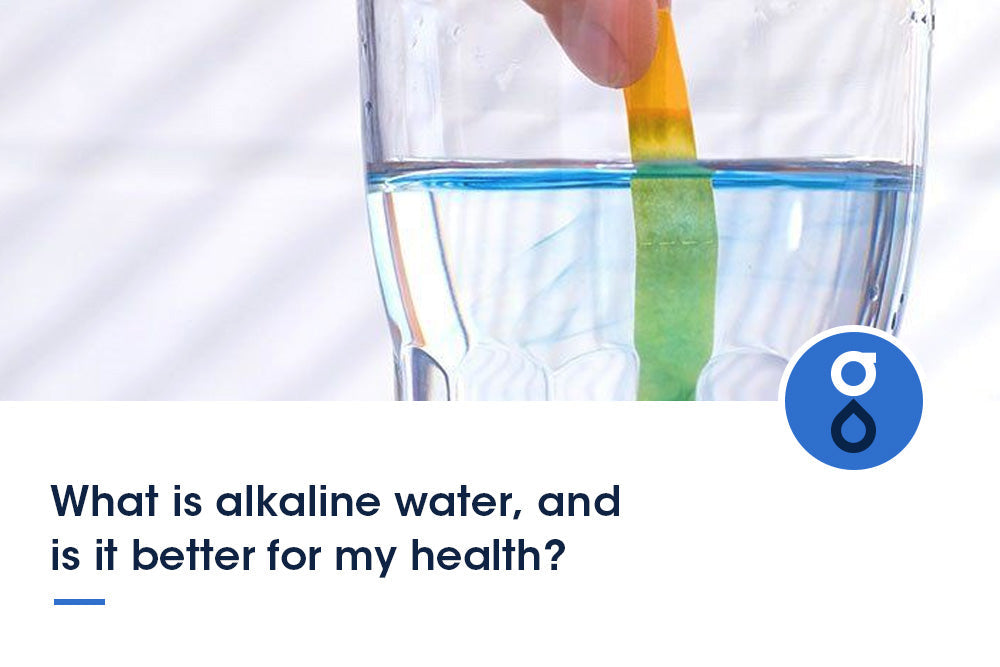Table of Contents:
What is alkaline water
How is alkaline water made
Alkaline water VS regular water
What are the beneficial effects of alkaline water
Are any health risks asoociated with alkaline water
Should you be drinking alkaline water
FAQs
Conclusion
Have you ever heard of alkaline water? It has become increasingly popular across the health and wellness industry and is now seen as a healthier alternative to regular tap water. But what exactly is alkaline water, and is it better for your health?
In this article, we'll dive into the science behind alkaline water, discover its potential benefits for your body, and explore whether it's worth investing in. From improving bone health to reducing high cholesterol levels, alkaline water could be a promising addition to your daily routine. So let's get started – read on to learn more about this mysterious drink!
What is alkaline water?
Alkaline water is a type of purified drinking water that has undergone a process known as electrolysis. This process raises the pH level of the water above the neutral 7, making it more alkaline.
Alkaline water is usually produced with special filters designed to remove impurities, such as chlorine, from regular tap water and add minerals to increase its alkalinity. Calcium, magnesium, potassium, and bicarbonate are the most common minerals used to raise the pH levels.
How is alkaline water made?
Alkaline water is produced by passing regular drinking water through a filtration system that contains special media, such as activated carbon, resins and minerals. These media are designed to remove impurities from the water while raising its pH level. During this process, the water passes through several stages of filtration, and the alkalinity increases accordingly.
The pH level can be further increased by adding minerals such as calcium and magnesium. Some companies use electrolysis to create an even higher pH level in their alkaline water products. While there is no definitive answer on which method produces the best alkaline water, it's important to note that all forms require rigorous testing for safety and quality assurance.
Alkaline water vs. regular water

Alkaline water is a type of water that has been treated to alter its pH balance. It contains minerals, such as calcium, magnesium, and potassium, which are believed to increase its alkalinity. The pH balance of regular drinking water is usually between 6 and 8.5 on the pH scale. Alkaline water typically has a higher pH level than normal drinking water, generally ranging from 8 to 9.5 on the pH scale.
The effects of acidic substances in the body can harm health, so some people believe that consuming alkaline water can help neutralize acidity and improve overall health. Alkaline water supporters also claim it can help reduce inflammation and improve hydration by providing additional electrolytes.
Many scientific studies have been conducted to evaluate claims about the potential health benefits of alkaline water, but the results have been inconclusive. Some studies suggest certain benefits may be associated with drinking alkaline water. In contrast, other studies have found no evidence of any health benefits related to its mineral content or alkalinity levels. Further research is needed before any firm conclusions can be made about the possible benefits of consuming this type of water.
What are the beneficial effects of alkaline water?
The potential health benefits associated with consuming alkaline water are largely based on its ability to restore the body's electrolyte balance and aid in detoxification effects. And there are some potential health benefits associated with its consumption:
· Improve bone health
Studies have suggested that drinking alkaline water rich in bicarbonate can help reduce bone resorption, which is breaking down old bone cells and replacing them with new ones. This can lead to increased mineral density and improved bone strength. Additionally, alkaline water may help replace essential minerals such as calcium and magnesium lost during physical activity. Therefore, incorporating alkaline water into their diet may benefit those at risk for osteoporosis or other bone health issues.
· Soothe acid reflux
Many people suffer from acid reflux, which occurs when the contents of the stomach, which are naturally acidic, splash back up the food pipe. This can cause damage and even develop into gastroesophageal reflux disease (GERD). Recent studies have suggested that consuming alkaline drinking water with a pH of 8.8 may help reduce symptoms of acid reflux as it kills pepsin, an enzyme breaking down food proteins and a leading cause for acid reflux.
While this is promising news, more research is needed before conclusions about its effectiveness can be drawn. Therefore, those looking to soothe acid reflux should consult their doctor or healthcare provider before making any major lifestyle changes.
· Enhance hydration

A 2017 study published in Biology of Sport found that drinking alkaline water positively affects hydration status. The study revealed that subjects who drank alkaline water experienced a significant decrease in specific urine gravity and an increase in urine pH, indicators of enhanced hydration.
This indicates that regular alkaline water consumption may benefit those looking to increase their body's hydration levels. In addition, drinking alkaline water also increases lactate utilization, which can improve energy levels and physical performance. Therefore, it is recommended that individuals looking to optimize their hydration status consider incorporating alkaline water into their diets.
· Increase longevity
Similarly, a 2017 study published in Oxidative Medicine and Cellular Longevity found that drinking alkaline water may benefit longevity. The study examined the effects of consuming alkaline water on 150 mice over three years. Histological examination of organs revealed no significant damage, but aging changes, emerged; organs of alkaline-watered animals were relatively superimposable to controls, suggesting that drinking alkaline water may reduce the risk of age-related diseases like heart disease.
The results showed that those who drank alkaline water had signs of greater longevity; in other words, they aged less and were more likely to live longer. This indicates that the regular consumption of alkaline water could promote healthier aging and help individuals live longer. Therefore, it is recommended that individuals looking to improve their physical health consider incorporating alkaline water into their diets.
· Reduce high blood pressure, blood sugar, and cholesterol
One such benefit is the potential to reduce high blood pressure, blood sugar, and cholesterol. A 2016 study conducted in Shanghai found that three to six months after drinking alkaline water, people with high levels of each had lower measures in each factor. This suggests that regular consumption of alkaline water can help regulate these levels and potentially reduce the risk of heart disease, stroke, and other chronic diseases associated with poor cardiovascular health.
Additionally, a 2017 study published in Oxidative Medicine and Cellular Longevity found that those who drank alkaline water had signs of greater longevity than those who did not drink it. Therefore, incorporating alkaline water into your healthy diet may effectively support better physical health by reducing high blood pressure, blood sugar, and cholesterol while promoting healthier aging.
Are any health risks associated with alkaline water?
One risk associated with drinking alkaline water is dental erosion. Studies have shown that consuming this type of water can increase the pH level of saliva above a safe level and lead to the dissolution of tooth enamel over time. While short-term exposure may not cause significant damage, long-term exposure can harm oral health and hygiene.
Additionally, there is little knowledge about the long-term negative side effects of alkaline water on the body if consumed regularly as part of a diet, making it difficult to assess its safety. Due to the lack of research on the potential risks associated with alkaline water, it is important for individuals considering drinking it regularly to consult with their healthcare provider first.
They should also ensure that any alkaline water they consume meets all safety standards regarding pH levels and other contaminants present in the product. It is also essential for individuals to consider making dietary changes or supplementing their diets with other healthy foods before relying solely on alkaline water to balance their body's pH levels.
Should you be drinking alkaline water?

Proponents claim that drinking alkaline water can help neutralize acid in the body, improve hydration, and boost energy levels. While some studies have suggested that alkaline water may provide health benefits such as improved hydration and reduced acid reflux symptoms, the research is far from conclusive.
Furthermore, experts warn that consuming too much alkaline water could disrupt the body's natural acidity levels and lead to digestive issues such as indigestion or constipation. Therefore, speaking with your doctor before making any significant dietary changes is essential.
Overall, drinking alkaline water isn't likely to cause any harm if consumed in moderation. However, it shouldn't be considered a "miracle cure" for any health condition or disease, especially since little scientific evidence proves its efficacy. Sticking with regular tap water or other healthy drinks may be the best option if you're looking to stay hydrated or improve your overall health.
FAQS
Does alkaline water change over time?
The answer is that alkaline water does change over time, but the extent of the change depends on multiple factors.
What alkaline water level is best?
The optimal pH level of alkaline water can vary, depending on one's needs. However, the ideal pH level for alkaline water is between 8.0 and 9.5.
Conclusion
Overall, alkaline water has the potential to offer health benefits. It is essential to select a product with the right balance of pH level and mineral content to get the most help. Additionally, it is best to talk to a doctor before drastically changing one's lifestyle or diet involving alkaline water.
Too much alkalinity can be detrimental, so moderation should be practiced when selecting an alkaline water product. Ultimately, individuals must decide if they believe the potential benefits of drinking alkaline water are worth any adverse effects that may arise.
















